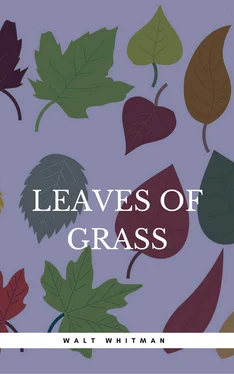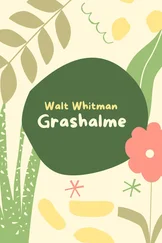Walt Whitman - Leaves of Grass
Здесь есть возможность читать онлайн «Walt Whitman - Leaves of Grass» — ознакомительный отрывок электронной книги совершенно бесплатно, а после прочтения отрывка купить полную версию. В некоторых случаях можно слушать аудио, скачать через торрент в формате fb2 и присутствует краткое содержание. ISBN: , Жанр: Языкознание, Критика, на английском языке. Описание произведения, (предисловие) а так же отзывы посетителей доступны на портале библиотеки ЛибКат.
- Название:Leaves of Grass
- Автор:
- Жанр:
- Год:неизвестен
- ISBN:9782377930524
- Рейтинг книги:4 / 5. Голосов: 1
-
Избранное:Добавить в избранное
- Отзывы:
-
Ваша оценка:
- 80
- 1
- 2
- 3
- 4
- 5
Leaves of Grass: краткое содержание, описание и аннотация
Предлагаем к чтению аннотацию, описание, краткое содержание или предисловие (зависит от того, что написал сам автор книги «Leaves of Grass»). Если вы не нашли необходимую информацию о книге — напишите в комментариях, мы постараемся отыскать её.
Leaves of Grass — читать онлайн ознакомительный отрывок
Ниже представлен текст книги, разбитый по страницам. Система сохранения места последней прочитанной страницы, позволяет с удобством читать онлайн бесплатно книгу «Leaves of Grass», без необходимости каждый раз заново искать на чём Вы остановились. Поставьте закладку, и сможете в любой момент перейти на страницу, на которой закончили чтение.
Интервал:
Закладка:
The leading idea of Walt Whitman’s poems is as old as the hills. It is the doctrine of universal sympathy which the first poet maintained, and which the last on earth will maintain also. He says:
Not a mutineer walks handcuffed to the jail but I am handcuffed to him and walk by his side,
Not a cholera patient lies at the last gasp but I also lie at the last gasp.
To show this sympathy he instances a thousand paltry, frivolous, and obscene circumstances. Herein we may behold the difference between a great and a contemptible poet. What Shakspeare—mighty shade of the mightiest bard, forgive us the comparison!—expressed in a single line,
One touch of nature makes the whole world kin,
this Walt Whitman has tortured into scores of pages. A single extract will show what we mean. This miserable spinner of words declares that the earth has “no themes, or hints, or provokers,” and never had, if you cannot find such themes, or hints, or provokers in—
Can it be possible that its author intended this as a portion of a poem? Is it not more reasonable to suppose that Walt Whitman has been learning to write, and that the compositor has got hold of his copy-book? The American critics are, in the main, pleased with this man because he is self-reliant, and because he assumes all the attributes of his country. If Walt Whitman has really assumed those attributes, America should hasten to repudiate them, be they what they may. The critics are pleased also because he talks like a man unaware that there was ever such a production as a book, or ever such a being as a writer. This in the present day is a qualification exceedingly rare, and may be valuable, so we wish those gentlemen joy of their Great Untamed .
We must not neglect to quote an unusual passage, which may be suggestive to writers of the Old World. To silence our incredulous readers, we assure them that the passage may be found at page 92.
The transformation and the ethereal nature of Walt Whitman is marvellous to us, but perhaps not so to a nation from which the spirit-rappers sprung.
I depart as air, I shake my white locks at the runaway sun;
I effuse my flesh in eddies, and drift it in lacy jags;
I bequeath myself to the dirt, to grow from the grass I love,
If you want me again, look for me under your boot-soles.
Here is also a sample of the man’s slang and vulgarity:
And here a spice of his republican insolence, his rank Yankeedom, and his audacious trifling with death:
Dig out King George’s coffin, unwrap him quick from the grave-clothes, box up his bones for a journey,
Find a swift Yankee clipper: here is freight for you, black-bellied clipper,
Up with your anchor! shake out your sails, steer straight toward Boston Bay.
The committee open the box and set up the regal ribs, and glue those that will not stay,
And clap the skull on top of the ribs, and clap a crown on top of the skull.
We will neither weary nor insult our readers with more extracts from this notable book. Emerson has praised it, and called it the “most extraordinary piece of wit and wisdom America has yet contributed.” Because Emerson has grasped substantial fame, he can afford to be generous; but Emerson’s generosity must not be mistaken for justice. If this work is really a work of genius—if the principles of those poems, their free language, their amazing and audacious egotism, their animal vigor, be real poetry and the divinest evidence of the true poet—then our studies have been in vain, and vainer still the homage which we have paid the monarchs of Saxon intellect, Shakspeare, and Milton, and Byron. This Walt Whitman holds that his claim to be a poet lies in his robust and rude health. He is, in fact, as he declares, “the poet of the body.” Adopt this theory, and Walt Whitman is a Titan; Shelley and Keats the merest pigmies. If we had commenced a notice of “ Leaves of Grass ” in anger, we could not but dismiss it in grief, for its author, we have just discovered, is conscious of his affliction. He says, at page 33,
I am given up by traitors;
I talk wildly, I am mad.
From the Examiner. (London, England.)
LEAVES OF GRASS. Brooklyn, New York.
We have too long overlooked in this country the great poet who has recently arisen in America, of whom some of his countrymen speak in connection with Bacon and Shakspeare, whom others compare with Tennyson—much to the disadvantage of our excellent laureate—and to whom Mr. Emerson writes that he finds in his book “incomparable things, said incomparably well.” The book he pronounces “the most extraordinary piece of wit and wisdom that America has yet contributed;” at which, indeed, says Mr. Emerson in the printed letter sent to us—“I rubbed my eyes a little, to see if this sunbeam were no illusion.”
No illusion truly is Walt Whitman, the new American prodigy, who, as he is himself candid enough to intimate, sounds his barbaric yawp over the roofs of the world. He is described by one of his own local papers as “a tenderly, affectionate, rowdyish, contemplative, sensual, moral, susceptible, and imperious person,” who aspires to cast some of his own grit, whatever that may be, into literature. We have ourselves been disposed to think there is in literature grit enough, according to the ordinary sense, but decidedly Walt Whitman tosses in some more. The author describes himself as “one of the roughs, a kosmos;” indeed, he seems to be very much impressed with the fact that he is a kosmos, and repeats it frequently. A kosmos we may define, from the portrait of it on the front of the book, as a gentleman in his shirt-sleeves, with one hand in a pocket of his pantaloons, and his wide-awake cocked with a dammee-sir air over his forehead.
On the other hand, according to an American review that flatters Walt Whitman, this kosmos is “a compound of the New England transcendentalist and New York rowdy.”
But as such terms of compliment may not be quite clear to English readers, we must be content, in simpler fashion, to describe to them this Brooklyn boy as a wild Tupper of the West. We can describe him perfectly by a few suppositions. Suppose that Mr. Tupper had been brought up to the business of an auctioneer, then banished to the backwoods, compelled to live for a long time as a backwoodsman, and thus contracting a passion for the reading of Emerson and Carlyle? Suppose him maddened by this course of reading, and fancying himself not only an Emerson but a Carlyle and an American Shakspeare to boot when the fits come on, and putting forth his notion of that combination in his own self-satisfied way, and in his own wonderful cadences? In that state he would write a book exactly like Walt Whitman’s “ Leaves of Grass .”
We must be just to Walt Whitman in allowing that he has one positive merit. His verse has a purpose. He desires to assert the pleasure that a man has in himself, his body and its sympathies, his mind (in a lesser degree, however) and its sympathies. He asserts man’s right to express his delight in animal enjoyment, and the harmony in which he should stand, body and soul, with fellow-men and the whole universe. To express this, and to declare that the poet is the highest manifestation of this, generally also to suppress shams, is the purport of these “ Leaves of Grass .” Perhaps it might have been done as well, however, without being always so purposely obscene, and intentionally foulmouthed, as Walt Whitman is.
Читать дальшеИнтервал:
Закладка:
Похожие книги на «Leaves of Grass»
Представляем Вашему вниманию похожие книги на «Leaves of Grass» списком для выбора. Мы отобрали схожую по названию и смыслу литературу в надежде предоставить читателям больше вариантов отыскать новые, интересные, ещё непрочитанные произведения.
Обсуждение, отзывы о книге «Leaves of Grass» и просто собственные мнения читателей. Оставьте ваши комментарии, напишите, что Вы думаете о произведении, его смысле или главных героях. Укажите что конкретно понравилось, а что нет, и почему Вы так считаете.












